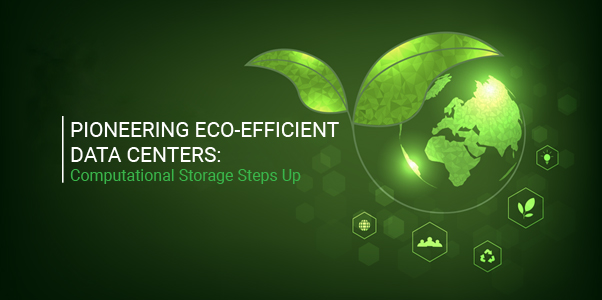
By JB Baker
In the digital age, data centers stand at the forefront of technological advancement, underpinning the global economy’s most critical operations. Yet, as these nerve centers grow, so does their appetite for electricity, presenting a formidable challenge in our collective quest for sustainability. Amid this backdrop, computational storage solutions emerge as a beacon of innovation, promising to redefine the landscape of data processing with unprecedented speed and energy efficiency.
The Imperative for Innovation
Data centers continue to grow in their position as significant consumers of global electricity, a trend that raises concerns about the environmental impact of our digital dependence. The booming demand for AI (and the high-power processors and systems needed for AI workloads) dramatically raised the visibility of the issues with data center power – powering just the H100 GPUs that NVIDIA shipped in 2023 could consume 4000GWhrs, and that’s not including the rest of the systems and networking that goes along with them. Meeting this escalating demand for faster data processing and more data storage necessitates innovations in the data processing pipeline – that is, how and when data moves between storage, memory, and processors as well as when and where data processing functions are performed. Computational storage solutions answer this call, offering a transformative approach that enhances processing speeds while drastically cutting energy consumption.
More powerful processing with less power consumption
Improving efficiency is quite possibly the number one tool for meeting these growing demands for gathering, storing, moving, and processing data in a sustainable manner. Efficiency, in terms of “work done per Watt of energy consumed,” is the overarching measure for sustainability.
Data center operators have long sought to improve their “PUE” (power usage effectiveness – how much of their power is used by the IT equipment vs how much power is used by other data center equipment such as the HVAC). Industry giants like NVIDIA note the need to meet the processing demands with fewer systems and processors.
And now, Computational storage drives (CSD) have emerged as a new tool for getting more from each Watt-hour of energy. CSDs are designed to improve application performance and infrastructure efficiency by integrating compute functions into the storage devices – moving some aspects of the processing to the drives. The architectural innovations in the CSDs result in not only improved performance, power efficiency, and sustainability at the device level, but also better efficiency for the system processors (CPUs and GPUs). CSDs have become a valuable tool in achieving the goal of doing “more work per Watt.”
Global Efforts and the Drive Towards Sustainability
With environmental sustainability climbing the global agenda, technologies like computational storage are poised for mainstream adoption. They align perfectly with industry analysts’ predictions and the growing emphasis on Environmental, Social, and Governance (ESG) goals within the corporate sector.
The Economic and Environmental Advantage
The cost and complexity of deploying new technologies are barriers that IT leaders face as they seek to operate more sustainably. Standards-based CSDs help overcome those challenges by offering significant cost reductions and enhanced performance, without requiring special skills, new software, or re-writing applications. Deploying CSDs in place of ordinary SSDs reduces overall hardware footprint, resulting in lower electricity usage and a smaller carbon footprint, for a sustainable solution that aligns with global efforts to diminish energy consumption in data centers. For companies committed to sustainability and efficiency, drives with computational storage represent an attractive proposition, marrying economic benefits with environmental stewardship.
Looking Ahead: The Future of Data Centers with Computational Storage
As the world grapples with the need for sustainable growth, the role of innovative solutions like computational storage becomes ever more critical. This technology is not just responding to current demands; it is shaping the future of the IT industry, contributing to a transformation in the efficiency and sustainability of data centers and the AI infrastructure. This vision aligns with the aspirations of technologists, executives, and leaders from Fortune 100 companies, and tech influencers globally, marking a significant step forward in our journey towards a more sustainable digital future.
JB Baker is Vice President of Products at ScaleFlux. He can be reached at [email protected].